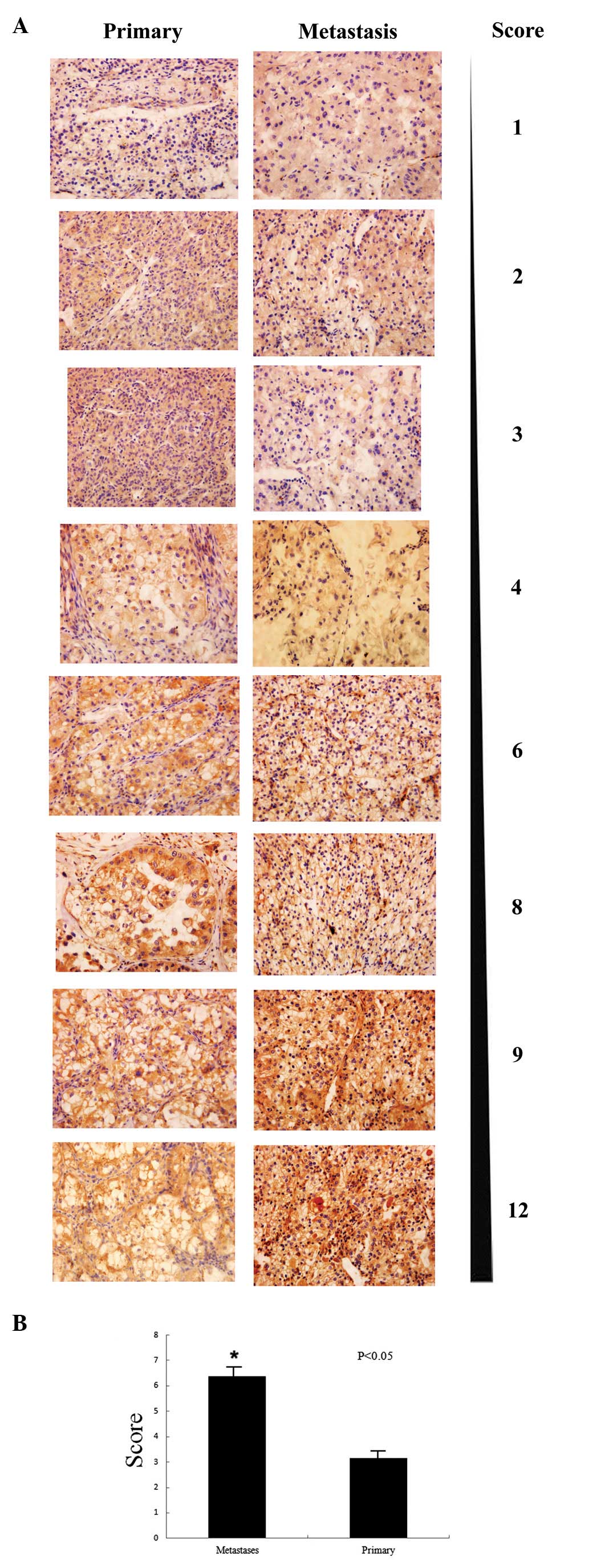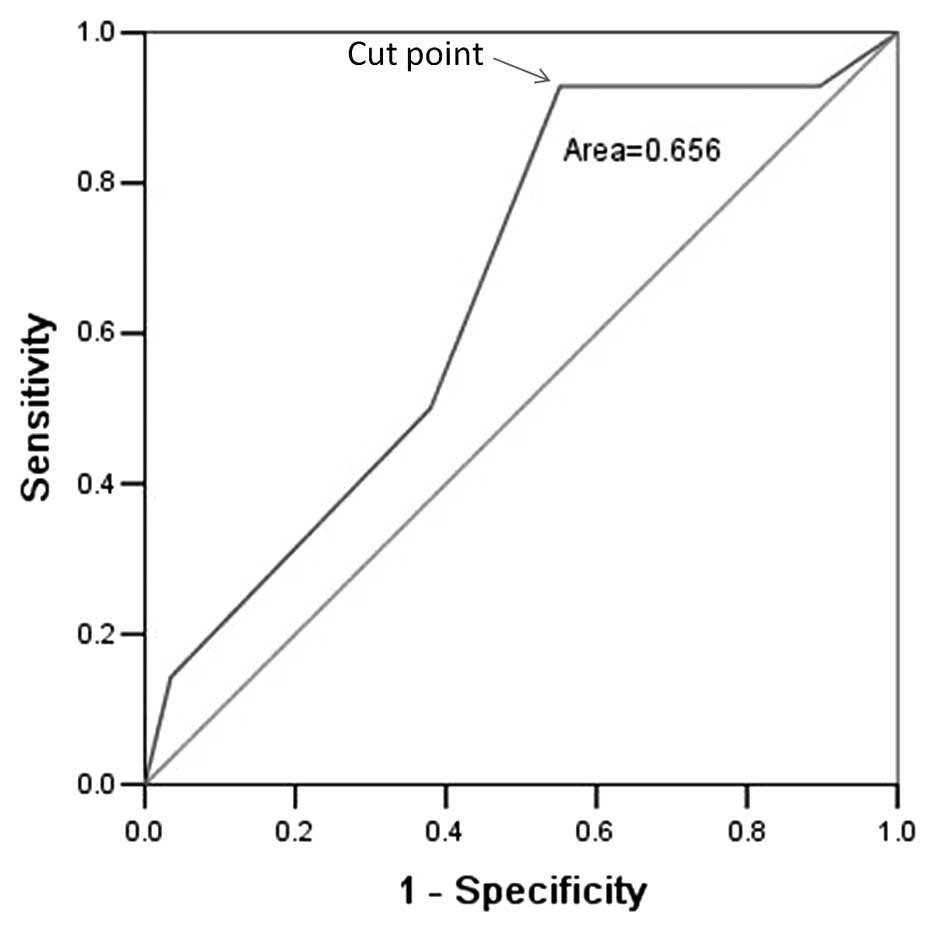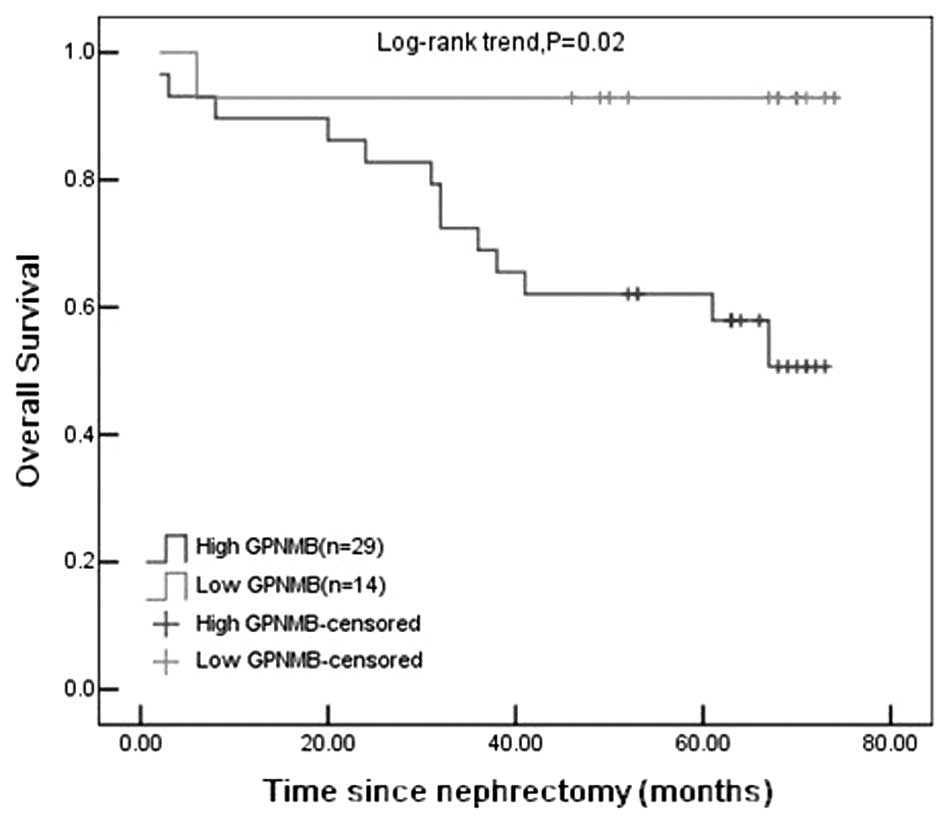|
1
|
Tan X, Zhai Y, Chang W, et al: Global
analysis of metastasis-associated gene expression in primary
cultures from clinical specimens of clear-cell renal-cell
carcinoma. Int J Cancer. 123:1080–1088. 2008. View Article : Google Scholar : PubMed/NCBI
|
|
2
|
Fang Y, Wei J, Cao J, et al: Protein
expression of ZEB2 in renal cell carcinoma and its prognostic
significance in patient survival. PLoS One. 8:e625582013.
View Article : Google Scholar : PubMed/NCBI
|
|
3
|
Minn AJ, Kang Y, Serganova I, et al:
Distinct organ-specific metastatic potential of individual breast
cancer cells and primary tumors. J Clin Invest. 115:44–55. 2005.
View Article : Google Scholar : PubMed/NCBI
|
|
4
|
Nguyen DX and Massagué J: Genetic
determinants of cancer metastasis. Nat Rev Genet. 8:341–352. 2007.
View Article : Google Scholar : PubMed/NCBI
|
|
5
|
Laird A, O’Mahony FC, Nanda J, et al:
Differential expression of prognostic proteomic markers in primary
tumour, venous tumour thrombus and metastatic renal cell cancer
tissue and correlation with patient outcome. PLoS One.
8:e604832013. View Article : Google Scholar
|
|
6
|
Abou Youssiff T, Fahmy MA, Koumakpayi IH,
et al: The mammalian target of rapamycin pathway is widely
activated without PTEN deletion in renal cell carcinoma metastases.
Cancer. 117:290–300. 2011.PubMed/NCBI
|
|
7
|
Reuter VE: The pathology of renal
epithelial neoplasms. Semin Oncol. 33:534–543. 2006. View Article : Google Scholar : PubMed/NCBI
|
|
8
|
Hong SB, Oh H, Valera VA, Baba M, Schmidt
LS and Linehan WM: Inactivation of the FLCN tumor suppressor gene
induces TFE3 transcriptional activity by increasing its nuclear
localization. PLoS One. 5:e157932010. View Article : Google Scholar : PubMed/NCBI
|
|
9
|
Hoashi T, Sato S, Yamaguchi Y, Passeron T,
Tamaki K and Hearing VJ: Glycoprotein nonmetastatic melanoma
protein b, a melanocytic cell marker, is a melanosome-specific and
proteolytically released protein. FASEB J. 24:1616–1629. 2010.
View Article : Google Scholar : PubMed/NCBI
|
|
10
|
Abdelmagid SM, Barbe MF, Hadjiargyrou M,
et al: Temporal and spatial expression of osteoactivin during
fracture repair. J Cell Biochem. 111:295–309. 2010. View Article : Google Scholar : PubMed/NCBI
|
|
11
|
Safadi FF, Xu J, Smock SL, Rico MC, Owen
TA and Popoff SN: Cloning and characterization of osteoactivin, a
novel cDNA expressed in osteoblasts. J Cell Biochem. 84:12–26.
2001. View
Article : Google Scholar : PubMed/NCBI
|
|
12
|
Loftus SK, Antonellis A, Matera I, et al:
Gpnmb is a melanoblast-expressed, MITF-dependent gene. Pigment Cell
Melanoma Res. 22:99–110. 2009. View Article : Google Scholar : PubMed/NCBI
|
|
13
|
Tan X, He S, Han Y, et al: Establishment
and characterization of clear cell renal cell carcinoma cell lines
with different metastatic potential from Chinese patients. Cancer
Cell Int. 13:202013. View Article : Google Scholar : PubMed/NCBI
|
|
14
|
Ohno Y, Izumi M, Tachibana M, et al:
Characterization and gene expression analysis of novel matched
primary and metastatic renal cell carcinoma cell lines. Oncol Rep.
20:501–509. 2008.PubMed/NCBI
|
|
15
|
Karashima T, Fukuhara H, Tamura K, et al:
Expression of angiogenesis-related gene profiles and development of
resistance to tyrosine-kinase inhibitor in advanced renal cell
carcinoma: characterization of sorafenib-resistant cells derived
from a cutaneous metastasis. Int J Urol. 20:923–930. 2013.
View Article : Google Scholar
|
|
16
|
Saw RP, Morgan M, Koorey D, et al: p53,
deleted in colorectal cancer gene, and thymidylate synthase as
predictors of histopathologic response and survival in low, locally
advanced rectal cancer treated with preoperative adjuvant therapy.
Dis Colon Rectum. 46:192–202. 2003. View Article : Google Scholar
|
|
17
|
Jones J, Otu H, Spentzos D, et al: Gene
signatures of progression and metastasis in renal cell cancer. Clin
Cancer Res. 11:5730–5739. 2005. View Article : Google Scholar : PubMed/NCBI
|
|
18
|
Kosari F, Parker AS, Kube DM, et al: Clear
cell renal cell carcinoma: gene expression analyses identify a
potential signature for tumor aggressiveness. Clin Cancer Res.
11:5128–5139. 2005. View Article : Google Scholar : PubMed/NCBI
|
|
19
|
Wang J, Chen A, Yang C, Zeng H, Qi J and
Guo FJ: A bone-seeking clone exhibits different biological
properties from the ACHN parental human renal cell carcinoma in
vivo and in vitro. Oncol Rep. 27:1104–1110. 2012.PubMed/NCBI
|
|
20
|
Thompson RH, Gillett MD, Cheville JC, et
al: Costimulatory molecule B7-H1 in primary and metastatic clear
cell renal cell carcinoma. Cancer. 104:2084–2091. 2005. View Article : Google Scholar : PubMed/NCBI
|
|
21
|
Zigeuner R, Ratschek M, Rehak P, Schips L
and Langner C: Value of p53 as a prognostic marker in histologic
subtypes of renal cell carcinoma: a systematic analysis of primary
and metastatic tumor tissue. Urology. 63:651–655. 2004. View Article : Google Scholar : PubMed/NCBI
|
|
22
|
Schultz L, Chaux A, Albadine R, et al:
Immunoexpression status and prognostic value of mTOR and
hypoxia-induced pathway members in primary and metastatic clear
cell renal cell carcinomas. Am J Surg Pathol. 35:1549–1556. 2011.
View Article : Google Scholar
|
|
23
|
Abel EJ, Culp SH, Tannir NM, et al:
Primary tumor response to targeted agents in patients with
metastatic renal cell carcinoma. Eur Urol. 59:10–15. 2011.
View Article : Google Scholar
|
|
24
|
Tse KF, Jeffers M, Pollack VA, et al:
CR011, a fully human monoclonal antibody-auristatin E conjugate,
for the treatment of melanoma. Clin Cancer Res. 12:1373–1382. 2006.
View Article : Google Scholar : PubMed/NCBI
|
|
25
|
Rich JN, Shi Q, Hjelmeland M, et al:
Bone-related genes expressed in advanced malignancies induce
invasion and metastasis in a genetically defined human cancer
model. J Biol Chem. 278:15951–15957. 2003. View Article : Google Scholar
|
|
26
|
Kuan CT, Wakiya K, Dowell JM, et al:
Glycoprotein nonmetastatic melanoma protein B, a potential
molecular therapeutic target in patients with glioblastoma
multiforme. Clin Cancer Res. 12:1970–1982. 2006. View Article : Google Scholar
|
|
27
|
Rose AA, Pepin F, Russo C, Abou Khalil JE,
Hallett M and Siegel PM: Osteoactivin promotes breast cancer
metastasis to bone. Mol Cancer Res. 5:1001–1014. 2007. View Article : Google Scholar : PubMed/NCBI
|
|
28
|
Onaga M, Ido A, Hasuike S, et al:
Osteoactivin expressed during cirrhosis development in rats fed a
choline-deficient, L-amino acid-defined diet, accelerates motility
of hepatoma cells. J Hepatol. 39:779–785. 2003. View Article : Google Scholar : PubMed/NCBI
|
|
29
|
Ripoll VM, Irvine KM, Ravasi T, Sweet MJ
and Hume DA: Gpnmb is induced in macrophages by IFN-γ and
lipopolysaccharide and acts as a feedback regulator of
proinflammatory responses. J Immunol. 178:6557–6566.
2007.PubMed/NCBI
|
|
30
|
Tomihari M, Hwang SH, Chung JS, Cruz PD Jr
and Ariizumi K: Gpnmb is a melanosome-associated glycoprotein that
contributes to melanocyte/keratinocyte adhesion in a RGD-dependent
fashion. Exp Dermatol. 18:586–595. 2009. View Article : Google Scholar : PubMed/NCBI
|

















